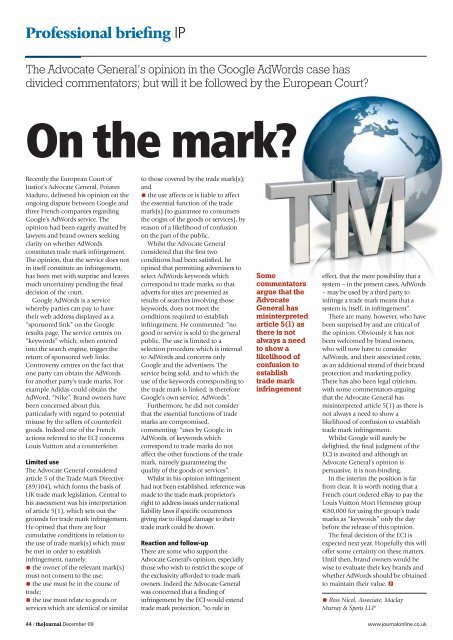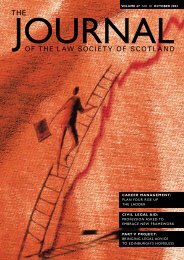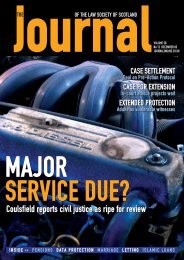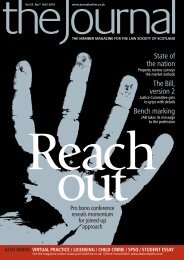Professional briefing - The Journal Online
Professional briefing - The Journal Online
Professional briefing - The Journal Online
Create successful ePaper yourself
Turn your PDF publications into a flip-book with our unique Google optimized e-Paper software.
<strong>Professional</strong> <strong>briefing</strong> IP<br />
<strong>The</strong> Advocate General’s opinion in the Google AdWords case has<br />
divided commentators; but will it be followed by the European Court?<br />
On the mark?<br />
Recently the European Court of<br />
Justice’s Advocate General, Poiares<br />
Maduro, delivered his opinion on the<br />
ongoing dispute between Google and<br />
three French companies regarding<br />
Google’s AdWords service. <strong>The</strong><br />
opinion had been eagerly awaited by<br />
lawyers and brand owners seeking<br />
clarity on whether AdWords<br />
constitutes trade mark infringement.<br />
<strong>The</strong> opinion, that the service does not<br />
in itself constitute an infringement,<br />
has been met with surprise and leaves<br />
much uncertainty pending the final<br />
decision of the court.<br />
Google AdWords is a service<br />
whereby parties can pay to have<br />
their web address displayed as a<br />
“sponsored link” on the Google<br />
results page. <strong>The</strong> service centres on<br />
“keywords” which, when entered<br />
into the search engine, trigger the<br />
return of sponsored web links.<br />
Controversy centres on the fact that<br />
one party can obtain the AdWords<br />
for another party’s trade marks. For<br />
example Adidas could obtain the<br />
AdWord, “Nike”. Brand owners have<br />
been concerned about this,<br />
particularly with regard to potential<br />
misuse by the sellers of counterfeit<br />
goods. Indeed one of the French<br />
actions referred to the ECJ concerns<br />
Louis Vuitton and a counterfeiter.<br />
Limited use<br />
<strong>The</strong> Advocate General considered<br />
article 5 of the Trade Mark Directive<br />
(89/104), which forms the basis of<br />
UK trade mark legislation. Central to<br />
his assessment was his interpretation<br />
of article 5(1), which sets out the<br />
grounds for trade mark infringement.<br />
He opined that there are four<br />
cumulative conditions in relation to<br />
the use of trade mark(s) which must<br />
be met in order to establish<br />
infringement, namely:<br />
the owner of the relevant mark(s)<br />
must not consent to the use;<br />
the use must be in the course of<br />
trade;<br />
the use must relate to goods or<br />
services which are identical or similar<br />
44 / the<strong>Journal</strong> December 09<br />
to those covered by the trade mark(s);<br />
and<br />
the use affects or is liable to affect<br />
the essential function of the trade<br />
mark(s) (to guarantee to consumers<br />
the origin of the goods or services), by<br />
reason of a likelihood of confusion<br />
on the part of the public.<br />
Whilst the Advocate General<br />
considered that the first two<br />
conditions had been satisfied, he<br />
opined that permitting advertisers to<br />
select AdWords keywords which<br />
correspond to trade marks, so that<br />
adverts for sites are presented as<br />
results of searches involving those<br />
keywords, does not meet the<br />
conditions required to establish<br />
infringement. He commented: “no<br />
good or service is sold to the general<br />
public. <strong>The</strong> use is limited to a<br />
selection procedure which is internal<br />
to AdWords and concerns only<br />
Google and the advertisers. <strong>The</strong><br />
service being sold, and to which the<br />
use of the keywords corresponding to<br />
the trade mark is linked, is therefore<br />
Google’s own service, AdWords”.<br />
Furthermore, he did not consider<br />
that the essential functions of trade<br />
marks are compromised,<br />
commenting: “uses by Google, in<br />
AdWords, of keywords which<br />
correspond to trade marks do not<br />
affect the other functions of the trade<br />
mark, namely guaranteeing the<br />
quality of the goods or services”.<br />
Whilst in his opinion infringement<br />
had not been established, reference was<br />
made to the trade mark proprietor’s<br />
right to address issues under national<br />
liability laws if specific occurrences<br />
giving rise to illegal damage to their<br />
trade mark could be shown.<br />
Reaction and follow-up<br />
<strong>The</strong>re are some who support the<br />
Advocate General’s opinion, especially<br />
those who wish to restrict the scope of<br />
the exclusivity afforded to trade mark<br />
owners. Indeed the Advocate General<br />
was concerned that a finding of<br />
infringement by the ECJ would extend<br />
trade mark protection, “to rule in<br />
Some<br />
commentators<br />
argue that the<br />
Advocate<br />
General has<br />
misinterpreted<br />
article 5(1) as<br />
there is not<br />
always a need<br />
to show a<br />
likelihood of<br />
confusion to<br />
establish<br />
trade mark<br />
infringement<br />
effect, that the mere possibility that a<br />
system – in the present cases, AdWords<br />
– may be used by a third party to<br />
infringe a trade mark means that a<br />
system is, itself, in infringement”.<br />
<strong>The</strong>re are many, however, who have<br />
been surprised by and are critical of<br />
the opinion. Obviously it has not<br />
been welcomed by brand owners,<br />
who will now have to consider<br />
AdWords, and their associated costs,<br />
as an additional strand of their brand<br />
protection and marketing policy.<br />
<strong>The</strong>re has also been legal criticism,<br />
with some commentators arguing<br />
that the Advocate General has<br />
misinterpreted article 5(1) as there is<br />
not always a need to show a<br />
likelihood of confusion to establish<br />
trade mark infringement.<br />
Whilst Google will surely be<br />
delighted, the final judgment of the<br />
ECJ is awaited and although an<br />
Advocate General’s opinion is<br />
persuasive, it is non-binding.<br />
In the interim the position is far<br />
from clear. It is worth noting that a<br />
French court ordered eBay to pay the<br />
Louis Vuitton Moet Hennessy group<br />
€80,000 for using the group’s trade<br />
marks as “keywords” only the day<br />
before the release of this opinion.<br />
<strong>The</strong> final decision of the ECJ is<br />
expected next year. Hopefully this will<br />
offer some certainty on these matters.<br />
Until then, brand owners would be<br />
wise to evaluate their key brands and<br />
whether AdWords should be obtained<br />
to maintain their value.<br />
Ross Nicol, Associate, Maclay<br />
Murray & Spens LLP<br />
www.journalonline.co.uk










